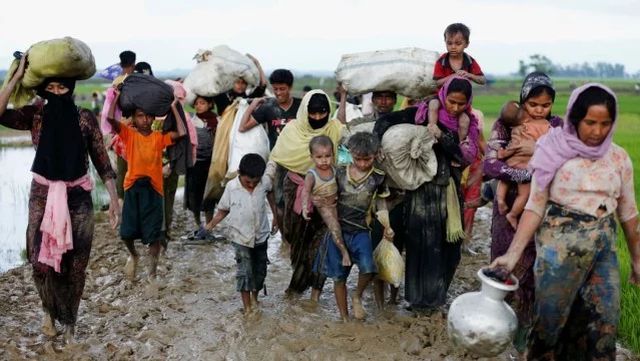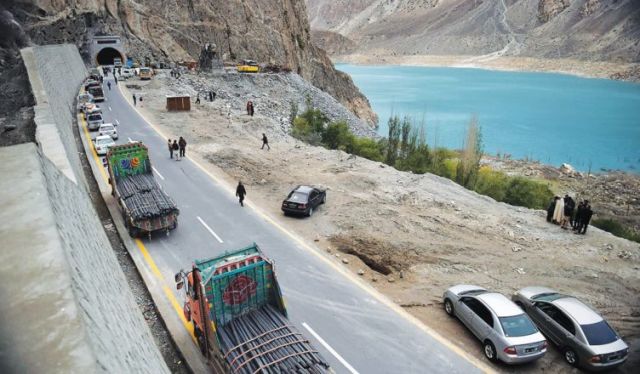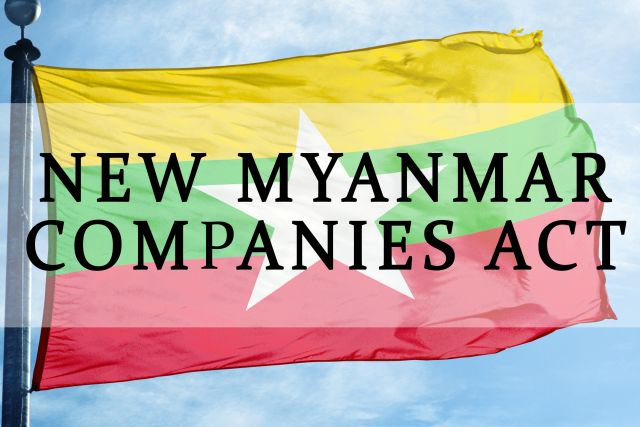
by Editor | May 25, 2021 | Markets, Social Media, World

A girl standing in front of a UN shelter for the internally displaced Rohingya in Myanmar. (Image: Reuters)
Geneva : The UN human rights experts have blamed Facebook for playing a key role in spreading hate speech against the Rohingya Muslims in Myanmar.
Marzuki Darusman, Chairman of the UN Independent International Fact-Finding Mission on Myanmar, said on Monday that the social media platform had played a “determining role” in Myanmar.
“As far as the Myanmar situation is concerned, social media is Facebook, and Facebook is social media,” ABC Online quoted Darusman as saying.
More than 650,000 Rohingya Muslims have fled Myanmar’s Rakhine state into Bangladesh since insurgent attacks sparked a security crackdown last August.
“(Social media) has … substantively contributed to the level of acrimony and dissention and conflict, if you will, within the public a Hate speech is certainly of course a part of that,” said Darusman.
UN Myanmar investigator Yanghee Lee said that “everything is done through Facebook in Myanmar,” adding it has been used to spread hate speech.
“I’m afraid that Facebook has now turned into a beast, and not what it originally intended,” she said.
Lee was speaking at the UN’s Human Rights Council in Geneva.
Facebook did not immediately comment on the fresh charges.
Lee, who was banned from Myanmar last year after it claimed a previous report by her was biased and unfair, said she had seen evidence that Myanmar’s military was continuing to target the Rohingya, razing their villages.
Last week, Sri Lanka barred social messaging networks, including Facebook, following violence against minority Muslims in Kandy district.
The government ordered internet and mobile service providers to temporarily block Facebook, WhatsApp and Instagram, as well as messaging service Viber, after officials said these platforms were fueling online hate speech.
—IANS

by Editor | May 25, 2021 | World
 Nay Pyi Taw : The ethnic cleansing of the Rohingya Muslim minority in Myanmar is continuing in Rakhine state, from where at least 700,000 people have fled to Bangladesh since August 2017, the UN said Tuesday.
Nay Pyi Taw : The ethnic cleansing of the Rohingya Muslim minority in Myanmar is continuing in Rakhine state, from where at least 700,000 people have fled to Bangladesh since August 2017, the UN said Tuesday.
The UN and human rights organisations have repeatedly criticised the atrocities allegedly committed by the Myanmar military in a campaign against the Rohingya that began in northern Rakhine following a coordinated assault by the Rohingya insurgent movement on August 25, 2017, reports Efe news.
UN Assistant Secretary-General for Human Rights Andrew Gilmour said that while the level of violence had been reduced, murder, rape, torture, abductions as well as forced starvation continued.
“It appears that widespread and systematic violence against the Rohingya persists,” Gilmour said in a statement issued after his visit to refugee camps in Bangladesh.
“The nature of the violence has changed from the frenzied blood-letting and mass rape of last year to a lower intensity campaign of terror and forced starvation that seems to be designed to drive the remaining Rohingya from their homes and into Bangladesh,” he added.
The UN expert also questioned how the Myanmar government could say that it was ready for the return of the Rohingya refugees while atrocities committed against them continued, and argued that “safe, dignified and sustainable returns are of course impossible under current conditions”.
Gilmour also praised the humanitarian response of Bangladesh and other international organizations to the Rohingya refugee crisis, but warned that the rainy season could leave “a devastating effect” on the refugee camps.
Bangladesh and Myanmar signed an agreement to start repatriating the Rohingya refugees at the end of January but the deal was suspended at the last minute by the Dhaka government.
The Myanmar military has denied claims of abuses, but in January recognised the extrajudicial killings of Rohingya in September 2017.
Myanmar does not recognize Rohingya as its citizens, arguing they are illegal immigrants from neighbouring Bangladesh, which has led to continued discrimination against the Rohingya community as well as restrictions on their freedom of movement.
—IANS

by Editor | May 25, 2021 | World
 Nay Pyi Taw : The non-profit Human Rights Watch on Friday urged the Myanmar government to stop the demolition of villages abandoned by the Rohingya minority in Rakhine state from where almost 700,000 members of the community have fled to Bangladesh.
Nay Pyi Taw : The non-profit Human Rights Watch on Friday urged the Myanmar government to stop the demolition of villages abandoned by the Rohingya minority in Rakhine state from where almost 700,000 members of the community have fled to Bangladesh.
HRW said satellite images revealed that the government has bulldozed dozens of Rohingya settlements and added that they should be preserved as “crime scenes” to investigate allegations of atrocities against the military, reports the BBC.
“Many of these villages were scenes of atrocities against Rohingya and should be preserved so that the experts appointed by the UN to document these abuses can properly evaluate the evidence to identify those responsible,” said Brad Adams, Asia Director, HRW.
“Bulldozing these areas threatens to erase both the memory and the legal claims of the Rohingya who lived there,” he added.
The Rohingya exodus started after August 25, 2017, when the military carried out a campaign in retaliation for attacks by a Rohingya rebel group on multiple government posts.
According to the HRW statement, since late 2017, authorities have used heavy machinery to clear at least 55 villages of all structures and at least two of the demolished villages were previously undamaged.
Between January 9 and February 13, bulldozers razed two settlements in the village of Myin Hlut that appeared intact in images from November 2017, the non-profit said.
“Deliberately demolishing villages to destroy evidence of grave crimes is obstruction of justice,” said Adams.
HRW said that 362 Rohingya villages had already been completely or partially razed during the military campaign last year.
The repatriation of Rohingya refugees, numbering around 688,000, should have began within two months of November 23, 2017 – when an accord between Bangladesh and Myanmar was signed – but Bangladesh decided to postpone the process in January.
The non-profit has demanded that representatives of the UN be given access to Rakhine to study the allegations the army committed murder, rape and other crimes.
—IANS

by Editor | May 25, 2021 | Business, Economy, Emerging Businesses, Large Enterprise, Markets, Medium Enterprise, News, Politics, SMEs
 By Ranjana Narayan,
By Ranjana Narayan,
New Delhi : As India prepares to celebrate the silver jubilee of its partnership with ASEAN in a big way, a key border trade link with Myanmar, the closest neighbour of the vibrant Southeast Asian bloc, continues to be hobbled by infrastructure and other issues — 22 years after it was launched.
India’s border trade with Myanmar takes place mainly through Moreh, in Manipur’s Chandel district, which links with Tamu, located in Sagaing in northwest Myanmar. There is another border trade point through Zowkhathar in Mizoram with the corresponding point Rhi in Myanmar, but Moreh is the biggest border trade point.
Though India and Myanmar signed the border trade agreement on January 21, 1994, and it was made operational the following year, the bilateral border trade figure stands at $50 million — a poor comparison to Myanmar’s trade with China, which was around $6 billion last year.
Myanmar has four border trading points with China, of which the one at Muse, in northern Shan state, is the biggest. Around 80 per cent of Myanmar’s formal overland trade with China passes through this post that links with Ruili, in China’s Yunnan province.
While China has pumped in massive amounts of money to build modern infrastructure at Ruili and also in Yunnan province to boost connectivity with Myanmar, the infrastructure at the India-Myanmar border post, Moreh, is still inadequate. An Integrated Check Post (ICP) at Moreh has been in the works for the past 10 years and is yet to be completed.
Besides the difficult terrain and militancy that adversely affect border trade at Moreh-Tamu, India in December 2015 officially put an end to the barter system, or trading of goods without exchange of money. According to Myanmarese media reports, the ending of barter trade “killed” India-Myanmar border trade.
Professor Priyoranjan Singh, an economist at Manipur University, says that since the Government of India notification ending barter trade, “the present state is that formal trade, or normal official trade, stands at zero, and informal, or illegal trade — or head load trade — is going on”.
He told IANS that there was a “huge information gap” between the two sides, including among the traders. “Our own Indian customs agency does not know the customs duty that Myanmar imposes on Indian goods,” he said.
Singh, who has expertise in the field, feels that “seriousness is not there” in India on boosting border trade, while China exhibits “huge seriousness, which is something Myanmar likes”.
Gautam Mukhopadhyay, former Indian envoy to Myanmar, says there are reasons for China’s border trade with Myanmar being more robust than India.
“First, Yunnan is a much better connected and more productive gateway from China to Myanmar than the Northeast of India to Myanmar. Secondly, for any Northeastern state of India to match China in cross-border trade, the region has to become a net producer than consumer, and better connected to the main productive regions of India,” Mukhopadhyay said.
He said efforts were being made in that direction. “But it will take some time and better coordination between our development, commercial and strategic policies for us to match China.”
He said the government has tried to address the issue of low volumes by liberalising cross-border trade and moving to the Most Favoured Nation trade status, but there was a “need for a reliable system to determine countries of origin of goods”. A lot of goods from China are available in the markets in the region.
Economist Ram Upendra Das, head of the Centre for Regional Trade, an autonomous institute under the Commerce Ministry, in his report on ‘Enhancing India-Myanmar border trade’ released last year by the ministry, says: “A major cause of discontent among local traders is that the pace of construction of Moreh ICP is very slow.”
Das told IANS that “it is very important that border trade is conducted through formal channels”, which would help increase the volume as India has slashed the tariff in a majority of items to zero, which means no border tax.
“There is an information gap and lack of understanding among the traders” on the benefits of conducting trade through the formal channel, he said. Informal trade would also give rise to corruption, in the form of levy imposed by militant groups and bribes, he added.
On China developing the infrastructure in Myanmar, Mukhopadhyay says: “China has made huge investments into power and extractive industries for its own interests, but very little into employment-intensive industries that really benefit Myanmar. China has been able to convert its more selfish investments into greater political clout than India. This is something we need to think about.”
(Ranjana Narayan can be contacted at ranjana.n@ians.in)
—IANS

by Editor | May 25, 2021 | Investing, World
 Nay Pyi Taw : Myanmar authorities will enforce a new Companies Law next year to attract more foreign investment.
Nay Pyi Taw : Myanmar authorities will enforce a new Companies Law next year to attract more foreign investment.
The new Myanmar Companies Act, approved by Parliament this month, was enacted to replace the Companies Act of 1914, Xinhua news agency reported on Thursday.
According to the Directorate of Investment and Company Administration (DICA), the new law will facilitate rapid registration for companies using the online registration system.
In accordance with the new law, foreign investors will be allowed to take up to 35 per cent in a local company.
Previously, a company with even 1 per cent of its shares owned by a foreign investor was classified as a foreign company, instead of a local company.
According to statistics, foreign direct investment (FDI) in Myanmar totalled to over $4.3 billion in the first half of the fiscal 2017-18, increasing by $3 billion, compared to the same period of the last fiscal.
—IANS






